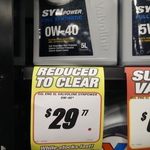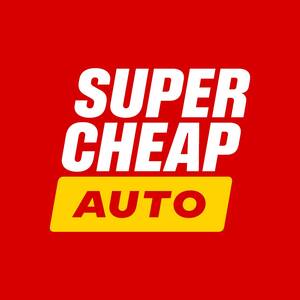Hey guys,
Was at my local SuperCrap for the spanner and socket deal today and saw that they had 0W40 Fully Synthetic on clearance
They had 3 bottles on show here and old stock from the free T-Shirt promotion, not sure if they have anymore out back or what stock is available nationwide
It has been taken off their site so it looks like the range might be updated soon with something else
0W40 is a thin starting oil so good if you live up in colder regions… I know they do factory fill 0W oils in many cars now so good if you want to stick to those oils
The manufacturers say that 0W oils are fine in our summers too but that's your call to make….. our Accord has 0W20 in it now but is going to 5W40 next change out of warranty
grades: API SN/CF, ACEA A3/B4, Meets requirements of: BMW LL-01, MB 229.3, 229.5, VW 502.00, 505.00, Porsche A40, Renault RN 0700, RN 0710
http://www.valvoline.com.au/explore-our-products/all-product…
Good deal because it's normally $60+ for a 5L bottle and 0W oils are never really discounted to 50% off like 5W or 10W oils…
http://www.datateck.com.au/lube/valv_auMS/ if you want to see what valvoline recommend for your car





Finally something I'm experienced in!
Disclaimer: I don't know what Honda you have or if the engine has issues with 20 weight oil recommended by the manufacturer.
With oils, the first number is how much the oil thickens when it cools compared to other oils of the same weight. The second number is the viscosity at operating temperature. The first number IS NOT the viscosity when cold.
A 0w20 oil will thicken less than a 5w20. A 30 (or 40, or 50) weight multigrade (eg 5w30) has completely different characteristics at all temperatures, cold, warm and hot.
The only correct way to get the right oil for your engine is to measure the oil pressure. Your engine's oil pump always pumps the same volume of oil, whether it's 0w10, 10w30 or 40w70 shitbox oil.
Engines have an oil pressure bypass valve. This valve bypasses oil at about 50-70psi depending on the engine.
Oil keeps moving metal parts from touching other metal parts. When moving parts are separated by the oil, the oil heats up, which thins it out.
Thick oil won't be able to flow as much between your big end and main bearings because it's too thick to pass through the tiny pathways. This means most of it will be lost as the oil pressure bypass valve dumps it back into the sump.
The small amount of oil that has already entered the bearing race will quickly heat up and thin out, reducing the ability of the oil to protect the engines vital parts.
If you use the correct viscosity of oil (Honda recommends a 20 weight oil), more oil flows through the bearings than is bypassed and dumped back into the sump. This cools the bearings, maintaining metal-metal separation and reducing oil thinning because more is flowing at an effectively higher pressure in the same space.
The old rule of thumb for oil pressure is 10psi per 1000rpm. I prefer more for daily driven cars, to achieve maximum oil pressure at the RPM the motor is commonly loaded up for maximum power. This varies for automatics and manuals.
Manual transmissions allow the driver to subject the engine to maximum torque (at the RPM) from idle. Obviously if the oil is below maximum pressure, it's not providing as much force to separate moving parts of the engine, meaning the 10psi/1000rpm rule of thumb is crap. An auto will stall up, so it's not possible to put the engine under full load below the stall speed of the torque converter. This means you can use a thinner engine oil for a car with an automatic transmission and provide full protection.
For an automatic transmission daily driven car, use an engine oil that provides maximum oil pressure about 1000rpm above the torque converters stall speed, which will be around the engines maximum torque envelope. Maximum oil pressure at about 3000rpm for most cars is probably the best compromise.
If you don't know what oil pressure your car is running at various temperatures and RPM's, any advice you take is blind.
Race cars are different because they live near maximum RPM at full load so the right viscosity is far more important than on a road car.
tl;dr going to a thicker oil will probably cause more engine wear.